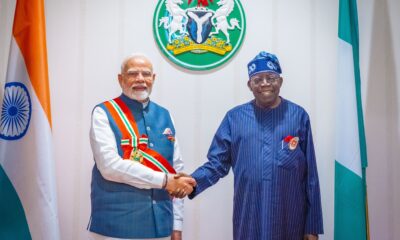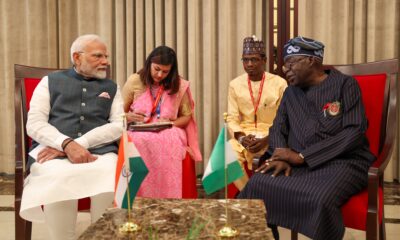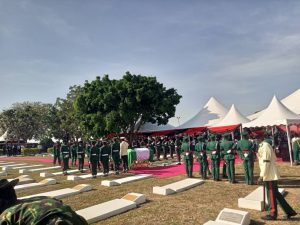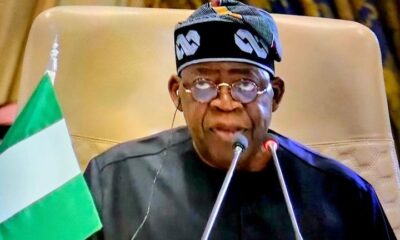NEWS
Tinubu Presses Panic Button, Summons Govs To Aso Rock
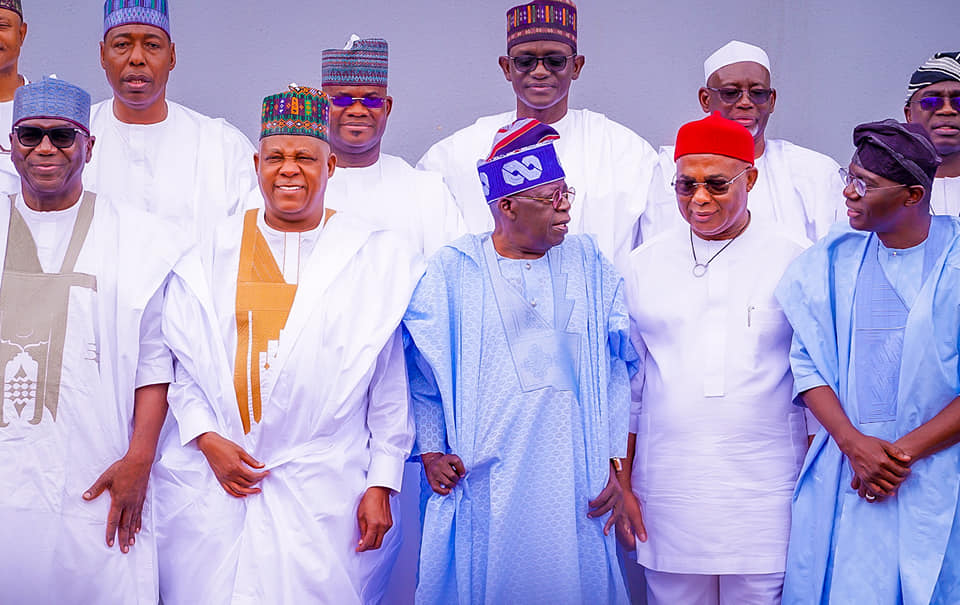
The twin evils of economic hardship and insecurity threatening Nigeria appear to have moved President Bola Ahmed Tinubu into panic mode.
He has summoned an emergency meeting with the governors, in Aso Rock, on Thursday before departing for Ethiopia for the African Union (AU) meeting.
Biztellers reports that the meeting is coming on heels of continuous outcry from relevant quarters including the Nigerian Bar Association (NBA) and the Northern Traditional Rulers Council, being chaired by the Sultan of Sokoto, Alhi Muhammad Abubakar lll.
The Sultan, who is also the leader of the Muslim in Nigeria, lamented that despite the President Tinubu administration being a continuation of the All Progressives Congress (APC) party governance, the hardship had gotten worse, breeding national anger induced by hunger.
He said, “To me, this government is a continuation of the former government; it is the same party. So, what really is the problem? I think that is one of the reasons we are here to talk to ourselves.
“We owe it a duty to the teeming millions of people that believe in the traditional institution to bring solutions to the various problems facing them. We will not fail in doing that. We will do our best.’’
He was addressing a gathering, which could be described as a mini national summit of the northern Nigeria in Kaduna on Wednesday.
Among the Sultan’s audience were prominent citizens and leaders including top members of the Arewa Consultative Forum (ACF), Coalition of Northern Groups (CNG) as well as the representatives of the Inspector-General of Police (IGP) and the Director-General of the Department of State Services (DSS), the Tor Tiv, Prof. James Iyerste, other traditional rulers, and citizens.
He challenged his audience to come up with ideas that could address the twin challenges of poverty and insecurity confronting the northern region.
This would have prompted President Tinubu to summon today’s meeting.
It was gathered that the Vice President Kashim Shettima would meet President Tinubu at the Council Chamber as a prelude to the meeting with the governors.
Shettima would go on to preside over the 139th session of the National Economic Council (NEC), the first in 2024, with the President set to depart for Ethiopia later in the day to participate in the 37th Ordinary Session of the Assembly of Heads of State and Government of the AU.
Aside what is in public space – economic hardship and insecurity, not much is known of the agenda, but the President’s Special Adviser on Information and Strategy, Bayo Onanuga had expressed the opinion that attention for solution should also be focused on the state governors and Local Government Chairmen.
He took to his verified X handle on Wednesday to assert that they should “wake up to their responsibilities” and resolve the food crisis and hardship in Nigeria.
He wrote, “The Federal Government is not the only actor in town. You have your duties cut out for you. Imagine each state making efforts to boost food production in its domain, build one world-class hospital, good roads, good schools etc. Imagine what our country would have become.’’
The ruling APC, the Presidency and the main opposition, Peoples Democratic Party (PDP) have been trading blames on the crisis confronting Nigeria.
Governors elected on the platform of the PDP had expressed concern that the ship of state was drifting uncontrollably.
They compared Nigeria’s economic situation to that of Venezuela, a South American country in the throes of hyperinflation, escalating starvation, disease, crime, and high mortality rates.
To this, the Presidency fired back, pointing to the poor performance of the governors, including their failure to pay salaries, pensions, and the N30,000 minimum wage.
Recall that hardship induced protests had broken out in different parts of Nigeria including Niger, Kano, Kogi, Ondo, and other states.
NEWS
Simon Ekpa’s Arrest Will Restore Peace In South East, Says Enugu Gov’t
The Enugu State Government has commended the Republic of Finland for the arrest of Simon Ekpa, a Finland-based leader of the proscribed separatist group, Autopilots.
Ekpa has been accused of orchestrating violence and chaos in Nigeria’s South East region.
In a statement issued on Friday by the Secretary to the State Government, Prof. Chidiebere Onyia, the government described Ekpa as a “common criminal, con man, and terrorist” who has exploited the Igbo people while claiming to represent their interests.
RELATED NEWS: Finnish Police Arrest Simon Ekpa Over Terror-Related Allegations
“The Enugu State Government welcomes the arrest of the Finland-based terrorist, Simon Ekpa,” the statement read.
“His arrest and trial will no doubt go a long way in strengthening peace, security, and stability in all parts of the South East.”
The state government accused Ekpa of sponsoring violent activities that have resulted in the loss of lives, destruction of property, and disruption of the region’s economic activities.
It stated that Ekpa’s actions were driven by personal greed and not genuine concern for the Igbo people.
Onyia said, “Ekpa is a murderer and fraudster who delights in killing his people and living large off their misery.
“He thrives on manipulating, exploiting, and extorting the people on the pretext of fighting for their interest and for the restoration of Biafra.”
The government emphasized its readiness to provide evidence of Ekpa’s alleged crimes to support his prosecution, whether in Finland or Nigeria.
“This arrest is in line with the demand of the Governor Peter Mbah Administration, which has repeatedly made it known that Ekpa is a megalomaniac, common criminal, murderer, and fraudster who takes joy in feeding fat on the manipulated emotions of Ndigbo and inflicting misery on the South East region,” the statement added.
The government further criticized Ekpa for fostering a climate of fear and insecurity that has harmed the entrepreneurial spirit and economic growth of the Igbo people.
“Ekpa has for long, and unfortunately from Finland, made a living by creating a siege climate and mentality in the South East, destroying lives, property, and the Igbo trademark of entrepreneurship and hard work,” Onyia said.
The Enugu State Government expressed optimism that Ekpa’s arrest would mark a turning point in the quest for peace and stability in the South East, urging residents to remain vigilant and supportive of ongoing efforts to restore normalcy in the region.
NEWS
JUST IN: COP29 Proposes $250bn Annual Climate Finance Target For Developing Nations
The COP29 presidency has unveiled an ambitious climate finance plan, calling on developed nations to provide $250 billion annually to developing countries by 2035.
The proposal, part of a broader initiative to mobilize $1.3 trillion from public and private sources each year, seeks to address the mounting challenges posed by climate change.
The five-page draft text, released on Friday, emphasizes the need for developed nations to lead the charge in financing climate action.
RELATED NEWS: COP29: Climate Summit Faces Deadlock Over Vague Funding Proposals For Vulnerable Nations
According to the document, this financial commitment is seen as a critical step toward combating the climate crisis and fostering sustainable development globally.
“In this context, it is decided to set a goal in extension of the goal referred to in paragraph 53 of decision 1/CP.21, with developed country Parties taking the lead, to USD 250 billion per year by 2035 for developing country Parties for climate action,” the draft states.
The announcement follows the release of an earlier 10-page draft on Thursday, which drew significant criticism from Global South delegations.
Many expressed frustration that the document lacked clear financial commitments from wealthier nations, falling short of expectations to support adaptation and mitigation efforts.
“There is a clear need to address the principle of common but differentiated responsibilities, especially given the diverse circumstances shaping national priorities,” a negotiator from a developing country delegation remarked.
The updated proposal aims to address some of these concerns by outlining more specific targets. However, skepticism remains among some negotiators, who feel the revisions still fail to adequately address their demands.
Meanwhile, developed countries have raised their own reservations about the proposed plan.
A European negotiator, speaking to Reuters, described the $250 billion annual target as unrealistic and criticized the lack of measures to expand the pool of contributing countries.
“No one is comfortable with the number because it’s high, and there’s almost nothing on broadening the contributor base,” the negotiator said.
The mixed reactions underscore the persistent divide between developed and developing nations in climate negotiations.
While the draft text aims to reconcile these differences, the gap between expectations and commitments remains a significant hurdle.
NEWS
Moghalu Prescribes Good Governance As Panacea To Ethnic Agitation

The President of the African School of Governance, Kingsley Chiedu Moghalu has admonished state actors against resorting to brutal force in the bid to muscle out separatist agitators.
In the aftermath of Mazi Simon Ekpa, the Finland based Biafran nationalist agitator being caught in legal web and the Nigerian government moving swiftly to seek his repatriation, the former deputy governor of the Central Bank of Nigeria (CBN) has cautioned that ‘We either fix our problems, or our problems will eventually “fix” us. No alternative to a renegotiated union.’
ALSO READ: Finnish Police Arrest Simon Ekpa Over Terror-Related Allegations
The political economist, while expressing his hope in Nigeria, made it clear that “hope is not a strategy”.
He bared his mind in a series of posts on his verified handle on micro-blogging site, X on Friday.
Moghalu wrote, “Despite sustained contemporary difficulties, I am hopeful about Nigeria. But hope is not a strategy. We need to improve state capacity for effective governance.
“We either fix our problems, or our problems will eventually “fix” us. No alternative to a renegotiated union.
“We must learn to be honest with ourselves and address the root causes of our problems. Why ignore them, when the problem is actually quite solvable? The problem with continuing with this approach is that when the danger crystallizes, those who thought they were benefiting from

